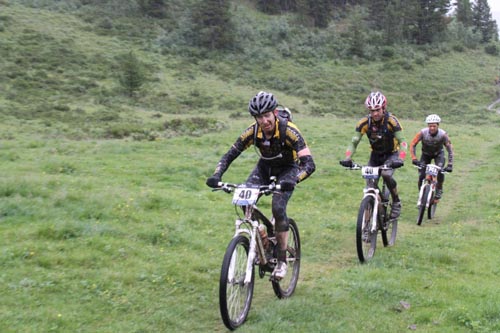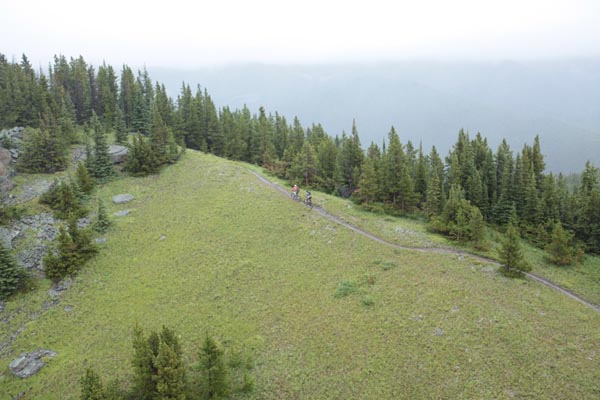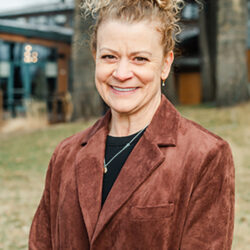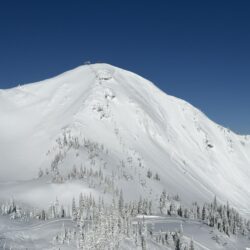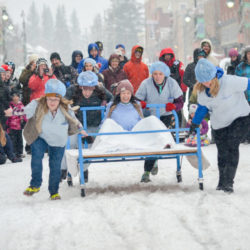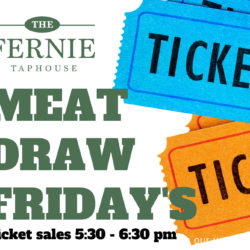Friendships are always strong and easy when skies are sunny and the going is smooth but life teaches us time and time again that the true measure of the bond in not measured in the sun, but when the weather turns bad and when the struggles begin.
So it is for teams in the TransRockies where impediments like differences in fitness and skill, technical issues and sickness are easily managed when weather is good and trails are dry. When the skies turn dark and the temperature drops, as happened on Friday, waiting for a slower or ailing partner means that the extra hours on the trail aren’t measured in extra sunshine but in wetness and cold.
Stage 6 of the 2010 TransRockies took riders from deep in the Elbow River Valley along three huge ridge ridgeline passes and then up and over Lusk Creek Pass down into the Bow River Valley to the finish line at Rafter Six Ranch. It was the most epic stage of 2010 and the riders were confronted with Rocky Mountain weather in all its power.
Late afternoon rain and hail the day before had left a coating of fresh August snow at elevations only slightly above than the 2200 metre high point of Stage 6. It was going to be cold at the top of JumpingPound Ridge and Cox Hill, the day’s twin summits. Intermittent showers and swirling clouds combined with the sub 5-degree temperatures on top confirmed that it was going to be a day of attrition and survival, rather than pure speed, out on the trails. This would be the day when terrain and conditions would test teams to the limit and when riders would have to be constantly aware of their teammate’s condition as much their own.
Though the TransRockies is intended to be a great test, it’s never been about unnecessary risks to riders and organizers made a decision on the morning of the stage to offer riders the option of cutting out the high-altitude ride along JumpingPound Ridge and Cox Hill, saving about 800 metres of climbing and two long sections above the treeline. Riders who chose to do so would be assigned a penalty but would still be considered officially part of the event as the 65km and roughly 1500 metres of climbing are more than enough to count as a full day’s work.
Many riders chose to take the shorter option though almost all the teams racing for points, position and prizes took the longer route. Whether they chose the shorter or longer options, riders streamed through the finish shattered by their battle with the elements. Normon Thibault of Frontrunners/Kona is a veteran of multiple stage and adventure races and said at the finish that Stage Six was “probably the hardest stage I have ever done” but the conditions seemed to suit him and his partner Wendy Simms just fine as they forged through the mud and clouds to their first stage victory of 2010. Their strong ride also took them up the standings a place so that they sit in second place after 6 stages.
Other riders described a ride of pure survival across the top where temperatures plummeted and winds gusted up to 50km/h. Not conditions for the faint of heart or weak of spirit. As so often happens in extreme conditions, time differences on the day were magnified by mechanical and physical issues. Bike parts that never fail, did, and Teams who seemed to be working in harmony ran into disagreements as cold and fatigue set in.
In the Open Men’s race Team Kona was the only team to finish the stage in less than 4½ hours and padded their overall lead to the point that only a major mechanical will stop them from grabbing the title tomorrow. Behind them, the Polish MtbTrophy.com team had their best race of the week, finishing in third and jumping up three places in the Overall to sit third with one day to go.
Like Frontrunners/Kona in the Open Mixed Division, first time stage winners were the order of the day with new stage winners in no fewer than four of the six categories. In the 80+ Men Division, Team Midas (David Hayward/Michael Powell) won their first stage of 2010. In the 80+ Mixed Division the Dynamic Charlotte Duo of Cricket Butler and Brian Conroy scord their first victory as well while the Dutch-Connection of Peter Meijler and Gerard Prince broke the clean sweep of the MountainCruzers in the 100+ Division winning their first stage.
Stage Six was proof that team format which has been integral to the TransRockies since day 1 is still part of what makes it so special. The teams who worked together best—looking after one another and drawing strength from each other, finished best and safest on the day. While endurance sports tend to attract individualists, the TransRockies forces them out of their comfort zone with the lesson that rewards earned as a team are very often deeper and more rewarding than solo efforts.
With just one stage left along the TransCanada Trail and up the Bow Valley, the end is in sight for the over 200 riders who have competed six days and 350km this far through the wild and unforgiving Canadian Rockies. Friends and family will await them on Canmore’s scenic Main Street with the Three Sisters as a backdrop to begin the celebrations. With day 6 as the ulitmate, every person who is awarded a 2010 TransRockies Finisher t-shirt and medal will know that they have been hard won.

